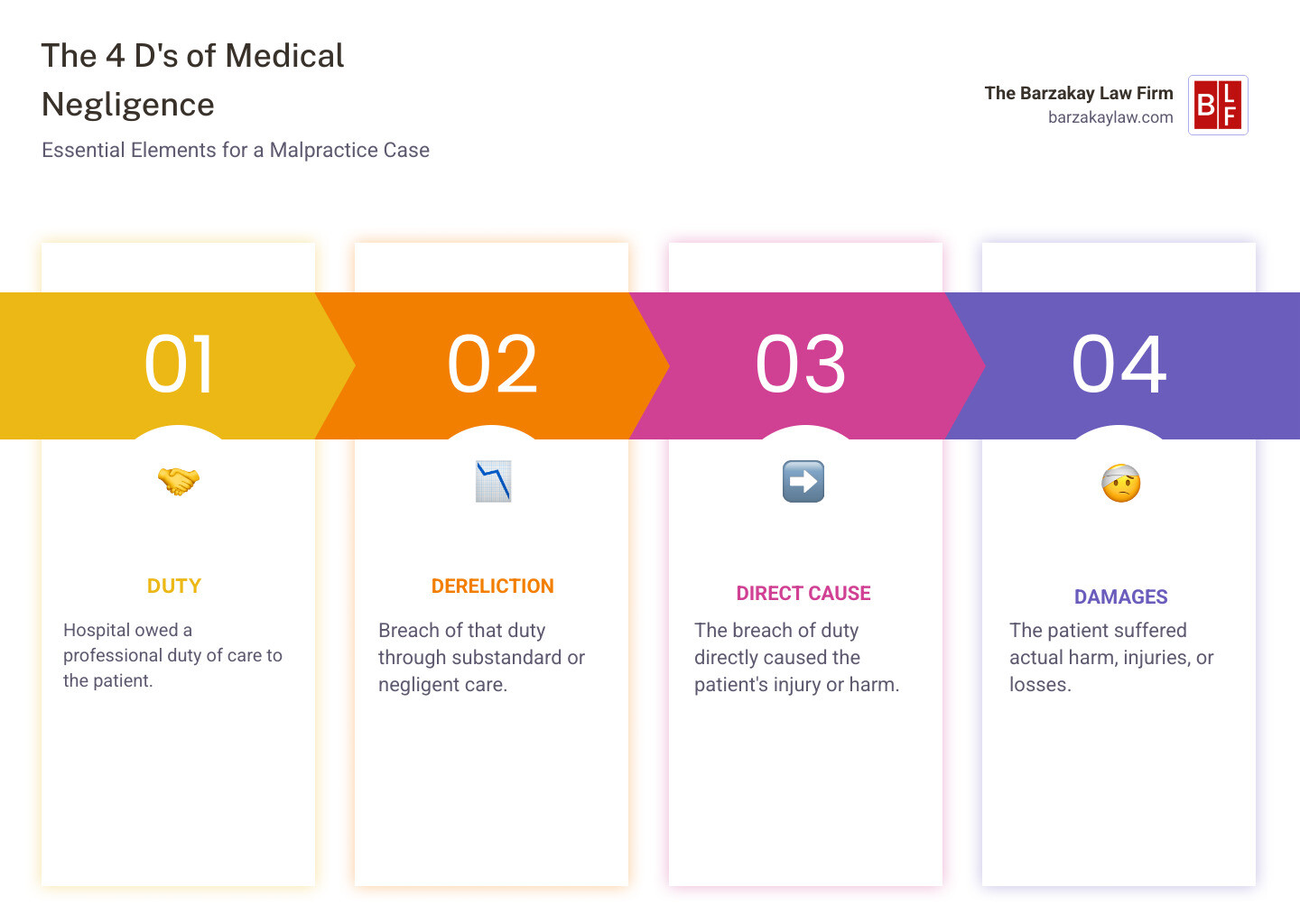When Medical Care Goes Wrong: Your Rights as a Patient
When you need to know how to sue hospital after experiencing medical negligence, the process involves key steps with strict deadlines. Here’s a brief overview:
Essential Steps to Sue a Hospital:
- Act quickly – Florida’s statute of limitations is typically 2 years from findy of harm.
- Gather evidence – Collect medical records, bills, and document your injuries.
- File a Notice of Intent – Required 90 days before filing suit in Florida.
- Obtain medical testimony – A qualified medical witness is needed to prove negligence.
- File your lawsuit – Submit a formal complaint to the court.
- Engage in findy – Exchange information with the hospital’s legal team.
Sometimes patients enter a hospital for routine care and end up in worse condition. Medical mistakes, from misdiagnosis and surgical errors to medication mix-ups, happen more often than people realize.
The path from patient to plaintiff is not simple. Hospitals have large legal teams and significant resources. They understand that medical malpractice cases are complex and expensive to pursue.
But when hospital negligence causes serious harm in South Florida communities like Miami, Hollywood, or Boca Raton, you have legal rights. The key is understanding what constitutes a valid case, how Florida’s legal process works, and why experienced legal guidance is important.
Medical malpractice cases require proving four essential elements, often called the “4 D’s” of negligence. Without all four, even a clear mistake may not lead to a successful lawsuit.

Determining if You Have a Valid Case Against a Hospital
Not every bad outcome at a hospital means you can sue. Understanding when you have a valid case is crucial if you’re wondering how to sue hospital for negligence. Medicine isn’t perfect, and complications can happen even with proper care. That’s unfortunate, but it’s not necessarily malpractice.
A valid medical malpractice case requires four key elements. If one is missing, the case will likely fail.
- Duty of Care: The hospital owed you professional care. This is established if you were their patient.
- Breach of Duty: The hospital’s care fell below the accepted medical standard. This means they failed to act as a reasonable hospital would have in the same situation.
- Causation: The hospital’s mistake must have directly caused your injury or worsened your condition. If you would have had the same outcome regardless, there is no case.
- Damages: You must have suffered real harm, such as medical bills, lost wages, or pain and suffering.
For a deeper understanding of these elements under Florida law, our Medical Malpractice Claims in Florida: A Comprehensive Guide covers the details.
What Constitutes Hospital Negligence or Malpractice?

Hospital negligence occurs when a poor decision, inadequate care, or failure to act causes harm. Common grounds for a lawsuit include:
- Medical errors like misdiagnosis, which can lead to wrong treatments, or medication mix-ups that cause dangerous interactions.
- Surgical mistakes, such as operating on the wrong body part or leaving tools inside a patient. Our guide to surgical errors explains these devastating events.
- Hospital-acquired infections that result from poor sanitation or staff failing to follow hygiene protocols.
- Emergency room errors, including misreading symptoms or delaying treatment for critical conditions like heart attacks or strokes.
- Inadequate staffing, where overworked nurses and staff miss important changes in a patient’s condition.
- Lack of informed consent, which happens when a procedure is performed without a full explanation of the risks, benefits, and alternatives.
Understanding a Hospital’s Legal Obligations
Hospitals are businesses with serious legal responsibilities to their patients.
- Patient safety: Hospitals must take reasonable steps to prevent harm from medical errors, falls, and infections.
- Hiring and supervising competent staff: They must verify credentials and ensure their doctors and nurses are qualified. Negligent hiring cases arise when they ignore red flags.
- Proper procedures and policies: Hospitals must establish and enforce rules for infection control, emergency response, and other safety measures.
- Vicarious liability: Under Florida law, hospitals are often responsible for their employees’ actions through the principle of respondeat superior.
- Corporate negligence: This holds the institution accountable for systemic failures, like unsafe facilities or inadequate oversight.
The patient bill of rights guarantees protections like informed consent and privacy. Violations that lead to harm can strengthen a case.
Suing the Hospital vs. an Individual Doctor
When you’re figuring out how to sue hospital for negligence, a key question is who to sue. The answer isn’t always simple.
- Hospital employees, including most nurses and some doctors, are directly employed by the hospital. The hospital is typically responsible for their mistakes under the respondeat superior doctrine.
- Independent contractors, like many doctors in specific fields, are not hospital employees. If they make an error, you might need to sue them personally.
- Apparent agency is an exception where a hospital can still be liable for an independent contractor’s actions. If you went to the ER and had no reason to know the doctor wasn’t an employee, the hospital may still be responsible.
Suing multiple parties is often the most effective strategy. We frequently sue both the doctor and the hospital to ensure all responsible parties are held accountable. This maximizes your chances of fair compensation.
How to Sue a Hospital: A Step-by-Step Guide
When you’re facing the aftermath of medical negligence, understanding how to sue hospital facilities in Florida can feel overwhelming. The legal process is intricate, with specific requirements and tight deadlines. Knowing what to expect can help you feel more confident.
Florida’s approach to medical malpractice is designed to filter out weak claims before they reach a courtroom. While this adds complexity, it means that cases that proceed often have a stronger foundation.

The process unfolds in phases: understanding time limits, gathering evidence, and completing Florida’s mandatory pre-suit requirements. Each step builds on the last to create a solid foundation for your case.
Step 1: Understanding the Time Limits on How to Sue a Hospital in Florida
Time is critical when you’re considering how to sue hospital in Florida. The state’s statute of limitations creates firm deadlines that, if missed, can permanently bar your case.
Florida’s two-year rule is the standard for most medical malpractice cases. You generally have two years from when you finded (or reasonably should have finded) that negligence caused your injury. This is known as the “findy rule,” as some medical mistakes are not immediately apparent.
For example, if a surgeon left an object inside you, the two-year clock would likely start when you finded it, not on the date of the surgery.
Special circumstances can modify these deadlines. For instance, wrongful death cases typically have a two-year limit from the date of death. The importance of acting quickly cannot be overstated. Evidence can disappear, memories fade, and witnesses move. Starting early also provides time to complete Florida’s mandatory pre-suit process, which takes several months.
Step 2: Gathering Crucial Evidence for Your Claim
Building a strong case requires careful evidence collection. When you decide to how to sue hospital, every document is potentially valuable.
- Medical records are the backbone of your case. We need comprehensive records, including nursing notes, lab results, and imaging studies, to establish the standard of care and show where it failed.
- Financial documentation proves your economic losses. This includes hospital bills, receipts for medication, and therapy costs. Pay stubs can help calculate lost wages.
- Personal documentation, such as a journal detailing your daily pain and limitations, can be powerful. Photos of your injuries over time are also compelling.
- Witness statements from family members can describe changes in your health and daily life.
- Hospital incident reports, if one was created for an event like a fall, can provide crucial details about what went wrong.
For cases involving newborns, specific evidence is critical. Our guide on Birth-Related Injuries & Medical Malpractice outlines what documentation is most important.
Step 3: The Florida Pre-Suit Process and What to Expect When You Sue a Hospital
Florida requires a detailed investigation before a medical malpractice lawsuit can be filed. This mandatory pre-suit process is designed to encourage early settlements.
The process begins by serving a Notice of Intent to Initiate Litigation on each potential defendant. This formal document informs the hospital and providers that you are considering a lawsuit.
This triggers a 90-day investigation period. During this time, both sides investigate the claim. The hospital must provide access to relevant medical records.
The Certificate of Merit is a crucial requirement. A qualified medical professional must review your case and provide a sworn statement that the care you received fell below accepted standards and likely caused your injury. This helps filter out frivolous claims.
If the case isn’t settled, filing the complaint officially starts the lawsuit. The case then enters the findy phase, where both sides exchange information through document requests, interrogatories (written questions), and depositions (sworn testimony).
Throughout this process, settlement negotiations often continue. Many cases resolve without a trial. However, having a legal team prepared for trial strengthens your negotiating position.
Building a Strong Case and Navigating Challenges
When you decide to how to sue hospital, you are entering a legal battle where the odds can feel stacked against you. Hospitals are businesses with experienced legal teams and insurance companies that have defended thousands of similar cases. They are prepared to use every tool to protect their interests.
These cases are complex. We must prove that a mistake violated medical standards, directly caused your harm, and resulted in quantifiable damages. Meanwhile, the hospital’s defense team works to find holes in your claim.
Financial costs can also be a barrier. Pursuing a case requires significant upfront investment for records, court costs, and witness fees. This is why most medical malpractice attorneys work on a contingency basis, making it possible for patients to seek justice.
The Critical Role of Medical Witnesses
Without qualified medical witnesses, a case against a hospital cannot succeed. These professionals are essential for:
- Establishing the standard of care: They explain what a competent healthcare provider should have done in your situation.
- Proving breach of duty: They identify how the hospital or its staff fell short of acceptable care standards.
- Explaining complex medical issues: They translate complicated procedures and diagnostic processes into terms a jury can understand.
- Testifying on causation and damages: They connect the negligence to your injuries and help establish your future medical needs.
Finding qualified medical reviewers willing to testify against colleagues requires connections and an understanding of who has the credentials to speak on substandard care.
Why Suing a Hospital Without a Lawyer is Risky
Attempting to how to sue hospital without legal representation is extremely risky.
- Complex legal rules: Florida’s medical malpractice laws are intricate. Missing a single deadline or filing requirement can destroy a valid claim.
- High costs of litigation: Medical witness fees, court costs, and other expenses add up quickly. If you lose, you are responsible for these costs.
- Access to medical reviewers: Florida requires a Certificate of Merit from a qualified medical professional before you can file suit. These professionals typically only work with established law firms.
- Negotiation skills: Hospital insurance adjusters and defense attorneys are skilled negotiators who know how to minimize payouts.
- Trial experience: Presenting evidence and cross-examining witnesses requires specific training. Hospital defense teams are seasoned trial attorneys.
Florida’s procedural requirements add another layer of complexity that can easily trip up individuals without legal training.
How Hospitals Defend Against Lawsuits
Understanding how hospitals defend themselves shows what you are up against when you how to sue hospital. Common strategies include:
- Denying negligence: They will argue that their staff followed proper procedures and met the standard of care.
- Arguing pre-existing conditions: They may claim your injuries were inevitable due to your existing health problems, not their negligence.
- Blaming the patient: They might argue that you didn’t follow instructions or contributed to your own injury.
- Known risk defense: They may argue your injury was a recognized complication of the treatment, not a result of negligence.
- Challenging causation: Even if they admit a mistake, they may argue it didn’t cause your harm.
- Contesting the amount of damages: If liability seems likely, they will focus on minimizing the compensation you receive.
Understanding Potential Outcomes and Compensation
When you’re exploring how to sue hospital, understanding what you might recover is crucial. While lawsuits can spotlight dangerous practices, their primary focus is to secure fair financial recovery for your losses.
Medical malpractice cases can result in substantial compensation, especially when negligence causes life-changing injuries. However, every case is different, and the outcome depends on the severity of your injuries, the strength of the evidence, and the clarity of the hospital’s fault.
| Economic vs. Non-Economic Damages |
|---|
| Economic Damages – Actual financial losses you can calculate with receipts and records |
| Non-Economic Damages – Personal suffering that’s harder to put a dollar amount on |
What Types of Damages Can Be Recovered?
If we prove hospital negligence harmed you, Florida law allows recovery for both financial losses and personal suffering. The goal is to restore you to the position you would have been in if the mistake never happened.
- Medical expenses: This includes all past and future costs for treatment, medication, and rehabilitation. For permanent disabilities, future medical costs can be substantial.
- Lost wages and earning capacity: This covers income you couldn’t earn and any reduction in your ability to earn in the future.
- Pain and suffering: This compensates for the physical discomfort and emotional distress caused by your injuries, including ongoing pain, anxiety, and depression.
- Emotional distress: The psychological impact of a medical mistake can be severe, leading to anxiety about medical care or fear of hospitals.
- Loss of consortium: This compensates your spouse for the negative impact your injuries have had on your relationship.
- Disfigurement: This applies when negligence leaves you with permanent scarring, amputation, or other changes to your appearance.
In rare cases of reckless behavior, punitive damages may be awarded to punish the wrongdoer. Florida does not cap economic damages, but there are specific rules around non-economic damages.
Recent Verdicts Show What’s at Stake
The financial stakes in these cases can be enormous, reflecting the devastating impact of the injuries. While past results don’t predict future outcomes, recent verdicts show that juries take medical negligence seriously.

Recent verdicts show that juries award tens of millions for catastrophic injuries from surgical errors, misdiagnosis, and medication mistakes. Here in Florida, we’ve seen significant outcomes. A Hillsborough County jury delivered a $38.75 million verdict for medical malpractice, while a Tampa jury awarded $28.5 million in another case. A $19.2 million verdict in Fort Myers shows that juries across Florida understand the serious impact of medical negligence.
These numbers are not guarantees, but they demonstrate that when hospitals fail in their duty and cause catastrophic harm, substantial compensation is possible. The verdicts reflect the lifetime impact these injuries have on victims and their families.
You can read more about successful outcomes in our detailed coverage of Medical Malpractice Verdicts Florida.
Frequently Asked Questions About Hospital Lawsuits
When you’re considering how to sue hospital, you likely have many questions. These are some of the most common concerns we hear from clients across South Florida.
Can a hospital be held responsible for a doctor’s mistake?
Yes, a hospital can be held responsible for a doctor’s mistake, but the legal reasoning depends on the doctor’s relationship with the hospital.
If the doctor is a hospital employee (like a staff doctor or resident), the hospital is generally liable for their negligence under a legal doctrine called respondeat superior.
The situation is more complex with independent contractors, such as many doctors in specific fields. However, the hospital may still be liable if you reasonably believed the doctor was a hospital employee (common in ERs in Miami or Orlando) or if the hospital was negligent in its own duties, like checking the doctor’s credentials.
In many cases, we pursue claims against both the individual doctor and the hospital to ensure the greatest chance of full compensation.
How do contingency fees work when hiring a lawyer?
Contingency fees make justice accessible. When you need to how to sue hospital, this payment structure removes the barrier of upfront legal costs.
With our firm, you pay no attorney’s fees unless we win your case. Our fee is a percentage of the settlement or verdict we secure for you, which is agreed upon at the start.
Medical malpractice cases involve significant expenses for records, medical witnesses, and court fees. We advance these costs on your behalf and are reimbursed from the settlement or award. This means you can focus on your recovery without financial risk.
What are my responsibilities as a patient?
While providers have a duty to provide proper care, patients also have responsibilities. Hospitals may use a patient’s failure to meet these as a defense.
Your main responsibilities include:
- Providing honest information about your medical history and symptoms.
- Following treatment instructions and keeping follow-up appointments.
- Asking questions if you don’t understand your diagnosis or treatment.
- Informing your medical team of any changes in your condition.
However, a patient’s actions rarely excuse a provider’s negligence. If the provider’s mistake was the primary cause of your harm, you may still have a strong case.
Conclusion
Taking legal action against a hospital is a difficult decision, often born from pain and the need for answers. Knowing how to sue hospital involves navigating a complex legal system with strict deadlines and well-funded defense teams. Florida’s laws are particularly intricate, with mandatory pre-suit requirements.
But you don’t have to face this alone.
When hospital negligence turns your life upside down, you deserve accountability and fair compensation for your medical bills, lost wages, and suffering.
At The Barzakay Law Firm, we stand beside families throughout South Florida—from Miami and Orlando to Hollywood, Boca Raton, and Fort Lauderdale. We understand that behind every case is a person whose life has been changed by a mistake.
Our commitment is straightforward: we work on a contingency fee basis, so you won’t pay us unless we win your case. We are invested in your success.
The legal system can be intimidating, especially when you’re recovering from an injury. We handle the legal complexities so you can focus on healing.
Time is a critical factor. Florida’s statute of limitations is unforgiving, and evidence can disappear. If you suspect hospital negligence played a role in your injury, don’t wait to explore your options.
Your first step is a conversation about what happened. If you believe you have a case, contact a Florida medical malpractice lawyer for a consultation to discuss your situation and learn about your legal rights.
Pursuing a claim isn’t just about your recovery—it’s about encouraging better practices that protect everyone.

